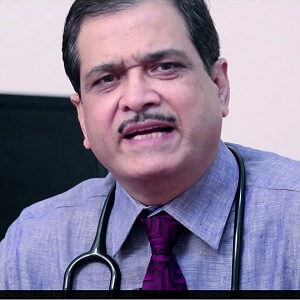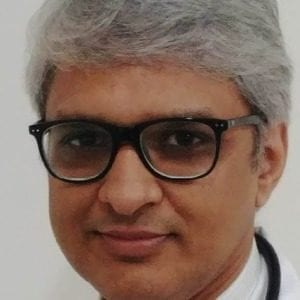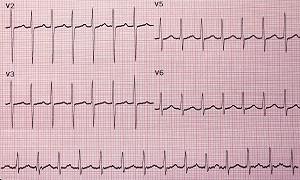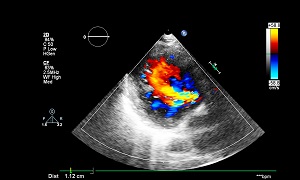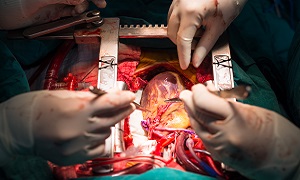Best Doctors in India for Pericardial Effusion Treatment
- Top Interventional Cardiologist | Apollo Hospital, New Delhi, India
- 26+ Years Experience
- Indraprastha Apollo Hospital, New Delhi
Profile Highlights:
- Dr. Rajeev Kumar Rajput is one of the best Cardiologists in India with nearly 23 years of experience. He is a clinical cardiologist engaged in diagnosing and treating cardiovascular diseases.
- Dr. Rajput is currently working as a senior consultant with Indraprastha Apollo Hospitals, New Delhi, and also offers patient care at the Heart & Gynae Clinic.
- Dr. Rajeev Kumar Rajput specializes in Angiography and Interventional Cardiology. The treatments provided involve Neonatal and Infant cardiac surgeries, Device Closure, and Valve replacement. He has expertise in Aortic Aneurysm Surgery, Vascular Surgery, Percutaneous Coronary Interventions, Endovascular Repair, Cardiac Catheterisation, Open Heart Surgery, and MV replacement.
- Dr. Rajput is credited with publishing several papers in noted medical journals.
- Cardiologist, Gurugram, India
- Over 20 years’ experience
Profile Highlights:
- Dr. Vivek Chaturvedi is a highly experienced and acclaimed cardiologist with over 20 years of experience.
- He has performed more than 2500 cardiac ablations, several of them for complex arrhythmias like atrial tachycardia, ventricular tachycardia, VPC, and atrial fibrillation using the latest technology like 3D Electroanatomic mapping.
- He has more than 50 publications in international journals & books.
- Interventional Cardiologist, Chennai, India
- Over 15 years’ experience
- Apollo Hospitals Greams Road
Profile Highlights:
- Dr. Sai Satish is a distinguished Senior Interventional Cardiologist affiliated with Apollo Hospitals in India, renowned for his pioneering contributions to the field of transcatheter valve therapies.
- His expertise extends internationally, as he also serves as a practicing interventional cardiologist and esteemed faculty member at the Gottsegen Institute of Cardiology in Budapest, Hungary, one of the world’s leading centers for TAVR (transcatheter aortic valve replacement) training.
- A trailblazer in the realm of minimally invasive cardiovascular procedures, Dr. Satish is celebrated for performing the highest number of percutaneous edge-to-edge mitral repairs (MitraClip implants) in the Indian subcontinent.
Best Hospitals in India for Pericardial Effusion Treatment
- City: New Delhi, India
Hospital Highlights:
- Over the last 33 years, the Fortis Escorts Heart Institute has set new standards in cardiac treatment with groundbreaking research. It is now known around the world as a centre of expertise for Cardiac Bypass Surgery, Interventional Cardiology, Non-invasive Cardiology, Paediatric Cardiology, and Paediatric Cardiac Surgery.
- The hospital has cutting-edge laboratories that perform a wide range of diagnostic tests in Nuclear Medicine, Radiology, Biochemistry, Haematology, Transfusion Medicine, and Microbiology.
- Fortis Escorts Heart Institute boasts a diverse group of bright and experienced doctors who are backed up by a team of highly qualified, experienced, and devoted support professionals as well as cutting-edge equipment such as the recently installed Dual CT Scan.
- Approximately 200 cardiac doctors and 1600 personnel currently collaborate to manage over 14,500 admissions and 7,200 emergency situations each year. The hospital now has a 310-bed infrastructure, as well as five cath labs and a slew of other world-class amenities.
- City: Faridabad
Hospital Highlights:
In the sprawling city of Faridabad, where healthcare needs are diverse and ever-evolving, one institution has consistently stood out as a beacon of excellence in the field of medicine—Marengo Asia Hospital. Established with a vision to provide world-class healthcare services to the community it serves, Marengo Asia Hospital has emerged as a trusted name synonymous with quality, compassion, and innovation in healthcare.
- City: New Delhi, India
Hospital Highlights:
- Equipped with 650 beds, BLK-Max Super Speciality Hospital is the largest stand-alone private sector hospital in Delhi.
- With over 1500 healthcare providers and 150 globally renowned super specialists, the hospital is one of Asia’s largest BMT Centres. The hospital is known for having some of the best cancer doctors in the country.
- The hospital is NABH and NABL accredited and was inaugurated by the first Prime Minister of India. Pt. Jawahar Lal Nehru.
- City: Chennai, India
Hospital Highlights:
- Located in Chennai, India, MGM Healthcare is a top multispecialty hospital that provides all medical services under one roof.
- Since its founding in 2019, MGM Healthcare has quickly become a leading national referral centre, creating several innovative flagship initiatives.
- MGM Healthcare combines next-generation medical and digital technologies to provide better patient results.
- With 12 centres of excellence, more than 400 inpatient beds, 100 intensive care unit beds, and 24/7 emergency care, MGM Healthcare leaves no chance in redefining the patient experience in Chennai.
- MGM Healthcare boasts 250+ expert doctors across 30+ departments, including Cardiology, Pulmonology, Neurology, Obstetrics & Gynaecology, and more.
- They house 12 specialized Centres of Excellence, including Neurosciences, Orthopaedics, and Multi-Organ Transplantation.
- Their team of doctors, nurses, and paramedics works together to give every patient individualized treatment.
- City: Noida, India
Hospital Highlights:
- Fortis Hospital, Noida, stands as one of the oldest and most trusted healthcare institutions in the region, setting a benchmark for comprehensive medical care.
- As the second mega hub hospital in the Fortis Healthcare Group, Fortis Hospital, Noida, upholds a legacy of trust among more than 1.2 million patients. By integrating top-tier professionals with cutting-edge technology, the hospital delivers superior treatment across various medical disciplines.
- Specializing in advanced Neurosciences, Orthopedics, Kidney and Liver Transplant Programmes, Fortis Hospital, Noida has successfully performed over 1,500 transplants, solidifying its reputation as a leader in specialized medical interventions.
Pericardial Effusion
A pericardial effusion is a condition in which there is an excess of fluid between your heart and the sac surrounding the heart, which is termed the pericardium. Although most of them are not harmful, they can sometimes make the heart work poorly.
The pericardium is a tough and layered sac. When the heart beats, it slides easily within it. The sac’s two layers have around 2-3 tablespoons of clear and yellow pericardial fluid. When you suffer from pericardial effusion, an excess of fluid sits in the sac. Small ones may contain 100 milliliters of fluid, while large ones may have more than 2 liters.
Symptoms
In some cases, you might have significant pericardial effusion without having any signs or symptoms. This may be the case if the fluid has increased slowly.
When symptoms of pericardial effusion occur, they might include one or more of the following:
- Shortness of breath or difficulty while breathing
- Chest pain, which occurs usually behind the breastbone or on the left side of the chest
- Discomfort in breathing while lying down
- Swelling in the abdomen or the legs
- Chest fullness
If you feel chest pain that lasts over a few minutes, then it might be best to call a doctor or emergency services.
Causes
Pericardial effusion may be caused due to inflammation of the pericardium in response to an ailment or injury. It might also occur when the flow of pericardial fluid is blocked or when blood collects within the pericardium, such as from chest trauma. Some other causes of this condition can include the following:
- Autoimmune disorders like lupus or rheumatoid arthritis
- Inflammation of the pericardium after a heart attack or a heart surgery
- Spread of cancer particularly lung cancer, breast cancer, leukemia, melanoma, non-Hodgkin’s lymphoma, or Hodgkin’s disease
- Cancer of the pericardium or heart
- Chemotherapy treatments for cancer
- Radiation therapy treatment for cancer if the heart was within the radiation field
- Waste products in the blood caused by kidney failure
- Underactive thyroid
- Trauma or puncture wound near the heart after an open-heart surgery
- Viral, bacterial, parasitic, or fungal infections
- Certain prescription drugs
Diagnosis
Physical Examination
Echocardiogram
Electrocardiogram
In this method, electrodes placed on your chest help to trace the heart’s electrical activity. Certain patterns on the electrocardiogram can signal a pericardial effusion or the inflammation that causes it. If it is suspected, an echocardiogram may be used to confirm it.
Once the effusion has been identified, your doctor will need to figure out its size and severity. Usually, it’s small and doesn’t cause any serious problems. However, if it is large, it may even compress your heart and hamper its blood-pumping ability. Known as cardiac tamponade, this condition can be life-threatening.

